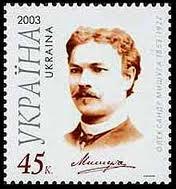He was the son of an Ukrainian shoemaker Filip Myshuha.
At age 15, he was already singing in the choir of St. Jur's
Cathedral in Lviv. He studied to be a teacher, and
worked in Lviv as a teacher in a parochial school.
During that time (1878–81), though, he was also taking singing lessons with the famous
Walery Wysocki,
and on September 13th, 1880 gave his first public performance, at a concert with fragments from Straszny dwór (The haunted
manor).
1881–83, he went to Milan to continue his studies,
working with A. Giovannini, and to Paris to study with Sbriglia. In 1882, having assumed the stage name Filippi
(from his father's first name),
he made his opera debut in Martha at Forlì, followed by performances in Milan, Florence, Turin, Nice, and
other cities.
In the autumn of 1883, he was engaged by the Lviv opera for a whole season, and was soon very popular, especially as an excellent
Jontek and Faust.
He sang at the Wielki in Warsaw from 1884 to 1892.
He toured Vienna (he made his debut on February 5th, 1885 as Fernando and sang there five more performances over the next month:
Nemorino, another Fernando, Edgardo, Duca and Alfredo), London (1885),
Prague (1887), Kiev (1895/96), St. Petersburg
(1903, new summer theater Olimpija),
Kharkiv, Stockholm, Krakow, Paris (not at the
Opéra), Berlin,
Frankfurt am Main, Hamburg, Köln, ...
1900–1902, he sang in Lviv at the private theater once founded by Stanisław
Skarbek; he sang in twelve operas there:
Halka, Straszny dwór, Lucia di Lammermoor, Fra Diavolo,
Faust, Carmen, Martha, La traviata,
Zaporozhets za Dunajem (with Solomija Krushelnytska), Lohengrin (1903)
and Der Freischütz.
His repertory included:
Goplana (by W. Żeleński, world premiere on July 23rd, 1896 in
Krakow) Janek (by W. Żeleński, title role written especially for Myszuga,
world premiere October 4th, 1900 in Lviv),
Lenskij, Jontek, Stefan (Straszny dwór), Faust,
Roméo, José, Werther, des Grieux (Manon),
Alfredo, Duca, Manrico, Otello,
Radamès, Riccardo, Canio,
Prince,
Neron, Sinodal, German, Raoul, Éléazar,
Masaniello, Fra Diavolo, Samson, Nemorino, Fernando,
Edgardo, Cavaradossi,
Turiddu, ...
After 1905, Myszuga devoted himself mainly to teaching. For six years, he taught a singing class at the Mykola Lysenko Music and
Drama School in Kiev,
and later, 1911–1914, he taught at the Chopin Higher School of Music in Warsaw.
He instructed subsequently excellent
artists such as:
Ewa Bandrowska-Turska, Janina Korolewicz-Wajda,
Maria Grebinetska,
A. Grigoryeva, M. E. Donets-Tessejer,
S. Zabello-Mazurkevich, V. V. Ljutse, M. V. Mykysha,
Sofya Mirovich, V. Rashkovskaja, Irene Solohub-Bocconi,
A. Kilchevskaja and many, many others.
He sang the part of Jontek once more in 1911, at the Warsaw Opera's
700th performance of Halka.
He went to Italy in 1914, and was there when the war broke out. He lost his sizable fortune as a result of the war.
He opened vocal schools in Rome and Milan; later, in 1919, for reasons that remain unclear, he moved to Stockholm, where he was
also involved
in teaching.
His health began to fail him, however; in 1922 he went to a sanatorium in Freiburg im Breisgau, where he died on
March 9th,
after unsuccessful cancer surgery.
Myszuga was definitely a singer of great format, one of the greatest of his time, valued
especially for his excellent Moniuszko interpretations.
Reference 1: Arkadij Pruzhanskij, Otechestvennye pevtsy 1750–1917, vol. 2, Moscow 2000
Reference 2
Sergej Levik on Myszuga (or Mishuga, as he uses the russified form of his name)
In Kiev in 1906, the tenor Aleksandr Mishuga-Filippi was spoken of as being an oustanding teacher. Until recently he had been the idol of
the Kiev public, especially as Jontek, but by then he was almost voiceless. I knew
his pupils slightly and made detailed inquiries about their teacher's methods, and finally I managed to get into his class for a few
hours.
This is what I learned from the visit.
Mishuga-Filippi gave the student a few minutes to sing, without any comments. He would then concentrate on one sound
and began to develop it.
Different syllables were pronounced on that sound (very often the names of notes), and the student had to achieve
an even and emotionless sound, irrespective of the degree of pressure. This could be achieved only by directing the air column
in one particular place,
into a tight mask, somewhere between the upper teeth and the upper half of the nose. The teeth were bared,
the lower part of the jaw lowered, his face became strained, and the sound took a uniformly lifeless colouring.
The teacher would make the voice go up and down from a fixed note on the same principle, as a result of which the registers
levelled out, the low notes
lost their chest tone and vibrato and the high notes became tight, the whole voice sounding like a sort of hooter.
According to the beliefs of Myszuga's disciples, this
guaranteed indefatigability and consequently a long-lasting voice, but it seemed to me that a voice trained in this way was in no
condition to give a good performance.
Sergej Levik An opera singer's notes
Well... good for Levik that he didn't live in the 21st century. I'd just wish that only ONE
of our contemporary tenors was as voiceless as Myszuga was in 1906. The two recordings below are from 1911...
|
